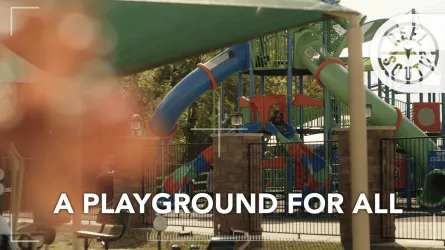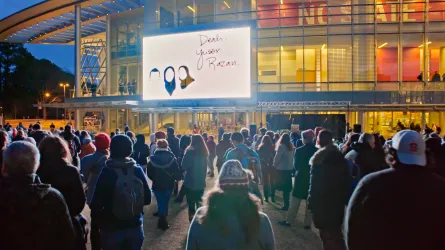North Carolina filmmakers D.L. Anderson and Matt Durning spoke to Reel South about their investment in the stories of their community and the importance of accountability in their work. This article is edited for clarity.
Lena Mae Perry is such a force throughout the film with many pieces of advice to offer. Which is your favorite that she gave in the film?
D.L. Anderson: It’s all in the title, stay prayed up! Since “Mother" Perry entered my life and in the process of making this film, I have leaned on and learned much from this simple advice; find time in your day to pause and give gratitude for the people you love in your life. Prayer doesn’t have to be one way either, it can look different for each and every person. As a practice, for me, I find offering sincere reflections on my community or difficult situations offers an opportunity for change. These small acts add up over time; that’s really evident in Mother Perry’s story and in her family and community. I love wearing my “Stay Prayed Up” t-shirt out in the world and hearing people’s responses. Recently we filmed an intro for PBS and a few folks asked where they could find the t-shirt; so now we have some available online.
We imagine you also got quite close to her, too. Did she provide any personal advice to you? If so, what was it, if you don't mind sharing?
Matt Durning: Mother Perry shares her wisdom as much through her actions as through her words, and we have been blessed by an abundance of both forms of her guidance during the 4+ years we have been lucky enough to know her. Most of Mother Perry's lessons center around the power of prayer, gratitude, and expansive love. A few favorites that stick with me are: 1) always be humble, 2) you never know what another person is dealing with so make everyone feel like they're not alone, and 3) never miss an opportunity to tell those around you that you love and appreciate them. She also taught me the practice of slowing down at least once a day to speak gratitude into the world through a prayer, a hug, humming a tune, or just a deep intentional breath. The last piece of advice I'll share is something she often said to us along the journey of making this film: "When God opens a door for me, I walk through it. Because he wouldn't lead me to it, if he wasn't going to lead me through it." I'm trying to walk with that courage in life and in my professional work.
What did you learn as you made the film?
D.L. Anderson: We, as White filmmakers working within a Black sacred space, knew that we needed to own and properly account for the historic power dynamic that exists in that relationship and develop an approach to trouble it. Michele Lanier, an AfroCarolinan folklorist, oral historian, and colleague helped guide an accountability process that included sharing ownership of the film with Mother Perry and inviting her daughter, Lena Williams, on as a Producer. This early process helped create deeper relationships at the center of the creative process that informed our focus and helped navigate difficult conversations and situations, such as filming during the COVID-19 pandemic. It has not been a perfect process, but we continue to listen, learn, and move in service to a story that began long before us; continuing to trust in the relations, love, and honesty that we share.
For documentary filmmakers looking to explore ways they can be more accountable to subjects and their community, we recommend checking out the Documentary Accountability Working Group’s framework and resources.
Were there any moments of the film that you wished you could have included, but didn't for whatever reason?
Matt Durning: Two things immediately come to mind: First, we wanted to include a deeper backstory of Mae's Country Kitchen and the deep impact that restaurant had on Mother Perry's community, both through physical sustenance (her chicken and dumplings are legendary!) but also the spiritual sustenance she provided to countless young men in their times of need. Hopefully, someday we can help her tell those stories in the way they deserve. Second, we wanted to include more of Wilbur Tharpe's incredible personal story -- his military service, his time as an award-winning Spanish teacher in Raleigh, and his years as a lounge piano performer at various restaurants around the area. The man's life was as rich as his smile and as joyful as his piano playing and he deserves much more recognition than he has received so far.
We're sorry to hear about Wilbur. Do you have any updates on all the participants in the film? What are they up to now?
D.L. Anderson: Mother Perry is doing well and was recently honored at The Branchettes' 50th singing anniversary (enjoy this video clip filmed by DL Anderson, and more photos. She made sure to mention how much she misses Wilbur at the anniversary and that sometimes when her phone rings she still thinks it might be him. There are some wonderful recordings of Wilbur performing solo that will hopefully be released soon, and we have enjoyed hearing from his family and so many of his former students. He made a lasting impression on so many and was awarded Wake County Teach Of The Year multiple times during his tenure as a Spanish and U.S. Government teacher. Phil Cook has been playing some incredible shows around his recently released solo piano record called "All These Years." One of the tracks, “Queen Of Branches,” is in honor of Mother Perry and is really moving.
What are you both working on now? Please brag about what you're currently working on if you can.
Matt Durning: Over the past few months, I've been lucky enough to have two other projects I directed and/or produced make their broadcast premiere on PBS. The first was a music performance series I directed for Music Maker Foundation called "Freight Train Blues," which aired in January and February. The second project was a music documentary that just premiered on PBS's lauded series, American Masters, called "Rissi Palmer: Still Here,” which I produced alongside local director Dilsey Davis. D.L. was the Director of Photography for us on that film and captured some beautiful and intimate moments with Rissi and her family. I'm currently in production on a documentary about the music of Thelonious Monk, and I'm in the early stages of development on a feature-length doc project about transforming educational models around climate change.
D.L. Anderson: It was a joy to be involved in another music documentary with Matt Durning for "Rissi Palmer: Still Here.” As part of the production, I traveled to the U.K. with Rissi and this incredible group of artists who were performing at the “Long Road Festival,” which showcases Americana and Country artists for a very British audience. It was a wild scene, with festival goers sporting brand new cowboy hats and boots and otherwise soaking up American music culture from a distance. It further reinforced my love for making films and meaning from the places where I live; and for programs such as “REEL SOUTH” for lifting stories up from Southern-based filmmakers. We love hearing from viewers who are touched by these films and encourage folks to follow along online at stayprayedup.film and Facebook / IG at @stayprayedupfilm.
Category
Share


